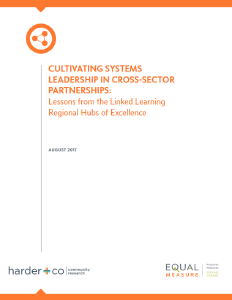The aim of this Issue Brief is to contribute to field dialogue and learning about the role of leadership in complex systems change strategies, particularly those focused on producing equitable impacts in college and career readiness.
Investments in the social sector have become increasingly complex, with many foundations shifting from supports for single organizations toward more systemic strategies focused on improving outcomes for entire communities. These efforts require coordination among stakeholders across all levels of the practice and policy continuum—from direct service providers, to nonprofit intermediaries, funders, advocacy organizations, and policymakers. It is in this context, and in the spirit of continuous learning, that The James Irvine Foundation’s Linked Learning Regional Hubs of Excellence (Hubs) investment serves as a systems change experiment, offering insights and critical lessons that can inform others undertaking similar work.
In this brief, we explore the Foundation’s investment and discuss the following questions:
- What is systems leadership, and why is it important for advancing complex, place-based, multi-stakeholder change efforts?
- What are the characteristics of effective systems leaders, and how can they be cultivated?
- How has systems leadership shown up in the Hubs investment?
- What are the implication of this initiative for others leading or participating in systems change efforts?
